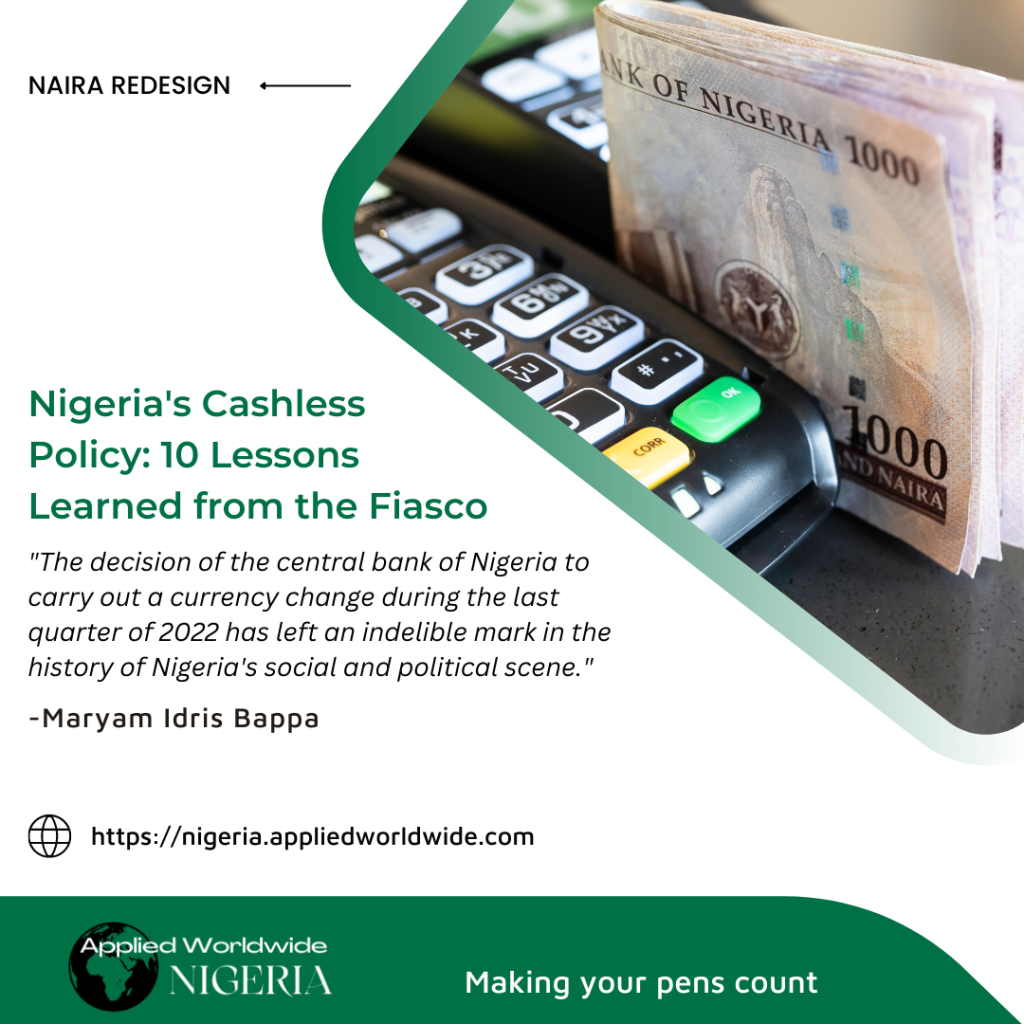The decision of the central bank of Nigeria to carry out a currency change during the last quarter of 2022 has left an indelible mark in the history of Nigeria’s social and political scene. The decision came at a time when the country was preparing to conduct an election that has now proven to be the most decisive and consequential exercise since 1999 when the country returned to democratic rule. A lot has happened from the time of the announcement of the decision to the deadline for the collection of the old currencies. There was an unprecedented level of Naira scarcity or as it’s commonly reported in the media, the Naira crunch.
The situation was so severe that banks virtually ran out of banknotes to offer their customers. The few Naira notes available in circulation were basically traded where a person pays 10-50℅ interest on any amount he requires.
It is on the back of this naira redesign policy that this article will look at some ten social lessons learned from the financial fiasco.

10 Lessons Learned from Nigeria’s Cashless Policy
- The paper serves as Temporary Legal Tender
The scarcity of cash forced customers to carry out transactions via online platforms such as USSD Transfer or Bank App transfers. But as is common with the Nigerian style, banks had poor networks, and transactions became stuck over the air or in most cases outrightly became unsuccessful.
The problem with bank networks aggravated people’s anxiety to no end and compounded their suffering.
As a response to the poor bank network, people resorted to using POS machines to transfer funds intended for a transaction. As many local shop owners had no POS machines, POS vendors offered bridge service in this regard. The POS vendors withdraw the money from the buyer’s credit card and issue a receipt, behind which the vendor’s signature will be written. The paper issued by the POS vendors served as legal tender to local shop owners who in turn collect the paper and provide the issuer with the goods they require.
At the end of the day, the local shop owners collate all the papers issued to them by sellers and tender them back to the POS vendors who are mostly located in close proximity to the shops. The POS vendor then transfers the total sum of money from the collated receipts into the bank account of the shop owner.
This situation exposed an important side of the communal cohesion and trust that exists between local residents. By coming together to devise an alternative means of making financial transactions in the absence of cash, we have learned the role of trust and communal unity in traversing through challenges.
- POS Vendors Overcome by Greed
As explained above, the services of POS vendors were severely sought as a last resort to the frustrating problems of poor bank networks. This meant the POS vendors were top of the financial transaction chain at the local levels. Their possession of a POS machine which proved to be more reliable than phone bank transfers, made their service become very essential in the local markets.
But as it is said that the market forces have no respect for emotions or circumstances, the POS vendors sought to make the most of their newly found relevance in the financial ecosystem by hiking their service fees.
Services that were hitherto the policy change charged at N100 were now doubled to N200. Some vendors charged N100 for every N1,000 transaction. In some extreme cases, vendors charged N200 for every N1,000.
This caused an artificial inflation of the cost of procuring goods at local markets. If a tuber of yam costs 1,500, one needs to pay N1,700 to the POS vendor in order to complete the transaction.
Where community members were able to devise means of using POS vendors as a reliable means of transaction, the POS vendors had a different thought in mind. It was a pure case of exploitation and manipulation on the part of the POS vendors.
This situation has taught us a lesson that no matter how bad a situation is, there is always someone willing to make a fortune out of the misfortune of the masses and the POS vendors perfectly fit this bill of social exploitation.
- Rise of FinTech Apps
As the exploitation of the POS vendors increased, local traders who had no bank accounts and resorted to using the POS vendors as bridges began to have second thoughts.
Customers who felt cheated by the exploitation of the POS vendors transferred their dissatisfaction to the local traders who in turn decided to either procure their own POS machines or at least open a bank account into which customers can directly pay for goods and services.
But there was a widely recorded failure of banks to efficiently handle online transactions. Hence, openers of new bank accounts resorted to FinTech apps over conventional banks. Mobile wallets and apps from financial solution providers such as Kuda Bank, Opay, PalmPay, and Moniepoint became the hottest cakes in town.
These apps came to the rescue of many Nigerians in times of dire need and did so with no extra charges or frustration. The greed of POS vendors and the incompetence of conventional banks gave rise to tech solutions to our financial problems. And as it stands, the opportunities for fintech in Nigeria are boundless.
- Vote-Buying Took a New Turn
Part of the rationale put forth by the Apex Bank of Nigeria for the Naira redesign and push to a cashless policy is the plan to reduce the monetization of elections in the country.
One of the major problems hindering free and fair elections in Nigeria according to many experts is vote buying and monetary inducement. Politicians go all out to ensure they win their elections and what better tool do they have to that effect than cash?
Clever as the politicians always are, they found a way to bye-pass the scarcity of cash to buy votes from prospective buyers. In many cities of Nigeria, there were reported cases of voters induced with spaghetti, kerosene, palm wine and even seasoning cubes in order to vote for certain candidates.
The experience of using barter in exchange for votes is one that underscores the level of poverty in Nigeria. It has to fault voters who collected these meager palliatives to partake in an election that will very well shape the next four years of their lives.
Poverty as it stands is the biggest stumble black against Nigeria’s development.
- Transport crunch
Another area of life that was most affected by the cashless policy is the transportation sector. As most Nigerians have no private means of transportation and the cities have no robust public transportation system, many people were left at the mercy of either trekking or sourcing for Naira despite the difficulty to pay for their transport fares.
Buses, taxes, and keke napeps make up the major means of transportation in Nigeria and none were willing to accept bank transfers as a means of payment. Bolts and Uber which operate a seamless online payment system for their transport services were simply beyond the reach of common Nigerians.
Schoolchildren who cover long distances to school were forced to stay at home as a result of the Naira scarcity. Parents were contending between using the few Naira notes they sourced at extreme lengths, to either use the notes for household needs or pay for their children’s transport fare.
Some schools had to relax their late-coming policy to accommodate children who trekked long distances to come to school. Certain workplaces were no exception in relaxing arrival times for their employees too.
The cashless policy amplified the weakness in many Nigerian cities’ transport systems. It offers valuable insight on the need to invest more in public transportation systems that are integrated with the latest technology.
- Inflation and Deflation of Prices
As discussed earlier, the greed of pos vendors by charging higher service fees for the meager cash they dispense or transfer service they provided, led to a trickle-down effect in causing inflation.
But that is not all, problems of deflation of food prices were also recorded in the rural markets. Village farmers who traveled to major food markets in rural areas were presented with unpleasant options when it came to selling their products.
Buyers of food products at rural markets forced village farmers to sell their wares below their market value if they wanted to be paid in cash or be paid in full via bank transfers. The farmer, being aware that his village neither had banks nor the network to make transactions, opted to sell his wares at a loss for cash.
This situation caused a reasonable amount of loss to village farmers. When villagers sell their products at a loss, it affects their potential to reinvest in the next farming session.
There was also speculation of persons with ill-gotten wealth who went to the village markets to buy out large stocks of foodstuff. And store them in a warehouse as a means of saving their stocked cash from expiring before the deadline of the currency swap.
- Increased Preference for One-Stop Shopping
One-stop shopping became an important factor considered by customers during the peak of Naira scarcity. Everyone was looking for a place where they could buy their needs on the go and pay once.
- Alm-Receivers Bore the Crunch
A substantial part of Nigeria’s population especially the Almajiri, the homeless, and persons with disability survive on the few Naira notes they could salvage from good Samaritans.
The Naira scarcity greatly affected the major stream of income of these groups of persons.
Religious institutions also recorded a decline in tithes paid by their members. Those without bank accounts now saw the need to open one.
For many people who are used to helping the needy with cash, the period of Naira scarcity was torturous for them. Seeing as they could barely offer financial help to those in genuine need.
A part of our psychology need to help and solve the monetary problems of those closest to us was put to the test by the cash crunch.
- Digital Money, Easy to Spend
The move to a cashless economy where physical cash was in short supply increased the thrift-spending nature of some people.
Cashless policy will come with its attendant changes in the lifestyle of people especially when it comes to how easily they spent their money.
- Nigerians Love Rushing against Deadlines
As is characteristic of most things Nigerian, we have a penchant for procrastination and doing things right at the dearth of the mark.
Many Nigerians did not take heed of the CBN’s call on Nigerians to deposit their old banknotes with their banks before 31st January 2023. It was only when the deadline was looming and appeared inevitable that many Nigerians began rushing to their banks to make deposits.
Expectedly, the banks were overwhelmed by the deadline rush, and the apex bank was compelled by the circumstances to extend the deadline.
In the end, the central bank had to bow to pressure from state governors and the general public to extend the deadline. The matter was contested at the supreme court. Which gave the injunction that old banknotes remain valid until the last day of 2023.
If we have learned anything from this fiasco is that we can bet that despite the extreme hardship experienced during the currency change, some Nigerians will still wait until the last day of the year before rushing to their banks to deposit their cash.
Conclusion
The plan to move to a cashless policy has reminded us of how interconnected every aspect of our social being is. And a cardinal glue that keeps everything together is money. A single policy decision was able to affect many aspects of our social lives. The decision to achieve a truly cashless economy in Nigeria may have been met with some challenges this time but it remains an inevitable change. Not only is cash going to be fully digital but the place of other digital currencies such as cryptocurrencies may have been given a needed nod on its place in our social fabric. The future is closer to us than we may care to admit.





